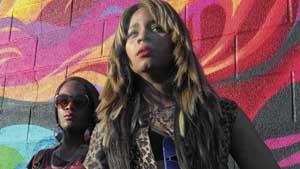
It was a very good year at the movies.
Mad Max: Fury Road. The third sequel to the post-apocalyptic classic Mad Max is the best action film since The Matrix: jaw-dropping, bold, ambitious and thrilling. Max (now played by Tom Hardy) is again a loner on the run in the barren wasteland left by a nuclear war. He’s teamed with another lone wolf Imperator Furiosa, who Charlize Theron instantly made iconic with physical and emotional ferocity. The genius of Fury Road is in George Miller’s visual storytelling, from the wrenching and dusty roller coaster chase scenes to the still moments of sometimes horrid desert beauty, which feels totally new. This is operatic action, bombastic and intense and engulfing and almost exhausting.
Carol. Todd Haynes’ indelible, sublime and perfectly observed film is based on Patricia Hightower’s 1952 classic lesbian romance The Price of Salt. Carol, played with aching beauty by Cate Blanchett, is a wealthy suburban wife in the midst of a divorce, and Rooney Mara plays Therese, a young shop girl making her way in New York. Blanchett’s sly, wise and only just barely vulnerable performance is among her best, and Mara is also perfect, expressing Therese’s wonder, love and grief with subtlety and sympathy.
Brooklyn. An assured Saoirse Ronan is Eilis, who leaves stifling small town Ireland for expansive and exciting Brooklyn in the early 1950s. She falls in love with an Italian-American plumber (Emory Cohen) but then returns home after a death in the family, suddenly unsure of where she belongs. An intimate but universal immigrant’s story, Brooklyn expresses the conflicts, joys and promise of leaving home. Nick Hornby’s adaptation of Colm Tóibín’s novel is seamless.
Ex Machina. Alex Garland made his directorial debut with this gorgeous psychological thriller about artificial intelligence, arrogance and misogyny. Slight and nerdy Caleb (Domhnall Gleeson) wins a contest to spend a week with reclusive, eccentric tech genius Nathan (Oscar Isaac), a hard-drinking boxing enthusiast dude bro. Caleb is actually brought to determine whether Nathan’s latest android has believably human artificial intelligence. Ava, played by Alicia Vikander, is clearly not human, but she is stunningly humanlike, both in her affect and her intuition. Vikander’s performance is epic, but it is Garland’s surprising, creepy and powerful script that is the real star.
Tangerine. This masterpiece of LGBT cinema is about one day in the lives of two transgender prostitutes in Hollywood. On Christmas Eve, hilariously enraged Sin-Dee (Kitana Kiki Rodriguez) is hunting down her boyfriend and the real fish he’s been cheating on her with. Meanwhile, weary, wise and tough Alexandra (Mya Taylor) wanders the streets, looking for friends to tell them about her cabaret show that night. Shot entirely on iPhones, the film is full of stunning compositions and saturated light. It is blisteringly funny and foul, and it is also moving: a paean to friendship and pride.
The Revenant. Leonardo DiCaprio may finally win his Oscar for his harrowing and masochistic performance as the insanely determined Hugh Glass, a hunter and guide in the 18th century American frontier who is left for dead by the unscrupulous John Fitzgerald, played by a wicked and brilliant Tom Hardy. The movie is long, extremely violent and at times unbelievable. Directed by Alejandro González Iñárritu and shot by Emmanuel Lubezki, The Revenent is engulfing, gorgeous, terrifying and by the end, transcendent.
Grandma. Lily Tomlin plays Elle Reid, a recently widowed lesbian poet, who is broke, unglued, directionless and a bit spiteful. When her teenage granddaughter Sage (Julia Garner) knocks on her door and says she needs $500 for an abortion, Elle must put herself together, find the money and earn redemption in time for Sage’s late afternoon appointment. The funny, subversive, and very gay script comes from director Paul Weitz, who provides Tomlin one of her best characters and who in turn gives us one of her greatest performances (which is saying something).
Spotlight. This taut and smart depiction of a Boston Globe reporters’ investigation into the sex abuse scandal in the Boston Catholic Church is the best film about journalism since All the President’s Men. Tom McCarthy’s trickless direction and his and Josh Singer’s efficient screenplay impeccably merge a complicated mystery with an indictment of a culture of secrecy, silence and deference to power. Most of the film’s major characters are occasional or lapsed Catholics, and their personal angst over what their faith has done shows the toll this kind of reporting can take. The film is as much about how these reporters got the story as it is about how the story got them.
Creed. Ryan Coogler’s Rocky sequel-cum-reboot turns Rocky into the trainer and Apollo Creed’s illegitimate son Donny into the boxer with something to prove. The plot is a by-the-numbers boxing movie, but Sylvester Stallone’s seventh turn as Rocky Balboa is arguably his best, and Michael B. Jordan is again sterling, this time as the young man with anger-management problems and a chip on his shoulder. Coogler pulls out these phenomenal performances and repurposes the Rocky tropes perfectly, using the Philadelphia landscape, fight choreography and the iconic music in surprising and thrilling ways.
The Big Short. Adam McKay has random celebrities – Anthony Bourdain, Selena Gomez – to explain the Byzantine financial procedures that were at the center of the financial collapse in 2008. It’s gimmicky but it works, and the rest of this intricate and smartly written film about the financial experts who figured out what was happening is enraging, fascinating and funny. The latest indictment of capitalist excess and immorality features most excellent turns from Steve Carell and Christian Bale.











